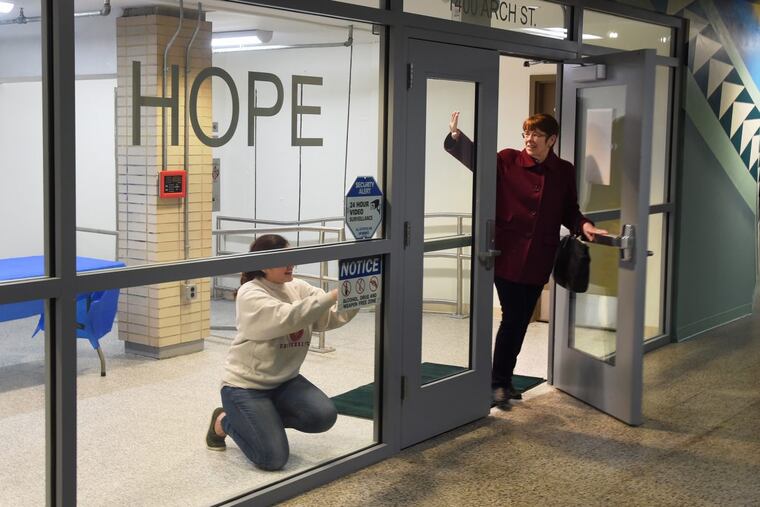Get a first look at Suburban Station's new homeless services center
SEPTA, the city of Philadelphia, and Project HOME debut a new service center for Philadelphia's homeless.

Guiding chronically homeless people to the assistance they need is a delicate process, said those who work with the city's indigent, and requires giving people with nowhere to go a place to feel welcome.
Between 800 and 900 people are estimated to live on the streets and spend their nights exposed to the elements. An additional 5,700 are in shelters or temporary housing, and an uncounted number put down beds in abandoned cars or buildings, or couch-surf with friends or relatives.
Starting Wednesday, they will be offered a safe place in an unlikely space: deep in the tunnels of Suburban Station, where Project HOME, SEPTA, and city government have cooperated to build a daytime service center designed to help the city's homeless. Hub of Hope, as the 11,000-square-foot facility is named, brings meals, medical care, social services, and basic amenities such as bathrooms, showers, and laundry machines to Center City, where a large portion of the city's homeless spend the day, but such services are scarce.
"We really see this as a community space, a space where everyone can feel welcome," said Emily Hopkins, hospitality coordinator with Project HOME.
Project HOME estimates that several hundred people a day will use the new center, which can accommodate up to 100 people at a time. The first thing a visitor will encounter is a waiting area where Wawa will provide free coffee. People will take a number, as at a deli, and when called, will tell workers what service they need. That can be as extensive as drug rehab and mental-health treatment, or as basic as a shower or meal.
Hub of Hope can simply be a place of respite. There are no requirements that people coming in get more extensive help, organizers said. The aspiration, though, is that when vulnerable people have a place where they can rest and feel welcome, they will be more open to offers of help.
"Through offering them hospitality, a place to sit down and rest, we hope to connect them to the larger services," said Carol Thomas, Project HOME's director of homeless services.
Beyond the waiting area are shower facilities, with three stalls, and three washers and dryers, as well as a living room furnished with couches and tables and a food service area. There's also an office where social workers can meet with clients. Farther along the space's central corridor is a room offering clothes and a small medical clinic.
The location itself represents an extreme repurposing of existing urban space. The walls still bear the original white and green tiles that once directed riders toward stairways to the city streets above. Trains on the Broad Street Line rumble softly in the background.
The area, which is roughly beneath the Municipal Services Building, had been used as a police substation but was abandoned about 15 years ago. Last summer, SEPTA began the $1.4 million renovation. SEPTA and the city evenly split the construction costs. Project HOME committed an additional $1 million, about $800,000 of which came from fund-raising efforts, to furnish the facility.
The space addresses a need long unanswered in Philadelphia, City Council President Darrell L. Clarke has said. SEPTA was contending with a growing population of homeless people occupying benches in transit centers such as Suburban Station and was looking for a humane way to address the problem. As far back as 2012, when Philadelphia faced controversy over homeless people being provided food on the Ben Franklin Parkway, there has been a need for a daytime service provider in Center City. A number of other locations didn't pan out before SEPTA suggested its space. Project HOME has used space in Suburban Station before, but that was a much smaller facility open only during the winter months.
SEPTA officials believe Hub of Hope, where extensive homeless services are being provided in cooperation with a transportation agency, is the only site of its kind in the country.
Hub of Hope will be open 7 a.m. to 7 p.m. Monday through Friday and 3 to 7 p.m. on weekends. Philabundance will provide meal service on Fridays and weekends, when other organizations that feed the homeless tend to close. Examination rooms will open for use starting in March, where Project HOME's physicians and other health-care workers will provide medical, dental, and behavioral health care. The examination rooms, not quite complete, include small showers where visitors can clean their feet.
Sister Mary Scullion, who leads Project HOME, has pointed to opioid addiction as one of the major drivers of homelessness in Philadelphia, and the clinic will include people qualified to give medical assistance to people in crisis because of addiction, as well as access to Alcoholics Anonymous and Narcotics Anonymous recovery programs. Project HOME also has an intensive residential program for long-term addicts called Journey of Hope that will be made available.
Medical care is being covered through grants and Medicaid, and behavioral health care will be funded through the city's Office of Behavioral Health.
The centerpiece of the facility is expected to be the living-room area. It's where food will be served, where activities like art therapy and group sessions will be held. It's also where the city's chronically homeless will be invited to treat the space as their own, an area where they can rest and introduce other homeless in the city to Hub of Hope for the first time.
"It's one step," Scullion said. "It's not the panacea, believe me, but it's one step because it opens one more door of opportunity."